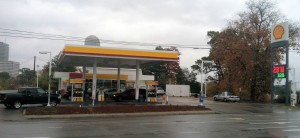Business 40 Project May Affect Broad Street Businesses
The project that will shut down Business 40 exits is not slated to begin until spring of 2016, but one downtown owner is already worried about the effect it will have on his business.
The North Carolina Department of Transportation (NCDOT) announced Oct. 6 that the project will shut down the Broad Street exit for good and the main access downtown will be at Cherry/Marshall Streets.

Gary Singh took over a 20-year lease of the Shell Station in April of 2013, but now worries that the shut down of a Business 40 exit will negatively impact his business.
Gary Singh took over a 20-year lease of the Shell station on South Broad Street in April of 2013, and said he never would have invested had he known that the state might close the Business 40 exit.
“We get most of our business from the exit,” Singh said. “I was stunned when I heard. Shocked.”
According to the NCDOT project website, Business 40 carries more than 70,000 vehicles per day. Singh said he relies on that traffic for the majority of his business.
Singh said that he was never notified about the exit closing and only learned about it when reading the Winston-Salem Journal. He said the state cannot compensate him monetarily for the loss of business caused by the project.
R.K. Patel is an owner of the Royal Inn, which is also on South Broad Street. He said that most of his tenants are local, so he does not believe the Broad Street exits closing will affect his business, but that he will not know for sure until the time comes.
“There is uncertainty as to what will happen to us,” Patel said.
Despite controversy caused by the changes, Michael Penney, Project Planning Engineer for the Business 40 project, said that the upgrade is long overdue. He said that in the 1.2 mile section of the project, there are a total of six interchanges. The current government preference is one interchange per mile.
Penney said the elimination of the Broad Street and Liberty Street exits will improve the roadway to a more current standard.
“It’s an interchange overload,” Penney said. “We’re hoping that by upgrading, we will reduce the number of conflict points.”
A conflict point is any place where two vehicles can potentially cross paths. Currently there are 20 conflict points in the project area, and the new system will reduce the number of conflict points to 10.
“Historically, if you reduce the number of conflict points, you reduce the number of accidents,” Penney said.
There were two main alternatives for the project. The first, which was chosen by the state Oct. 6, was the Cherry/Marshall option, which means that Liberty and Main Streets will no longer connect to Business 40. The second alternative was the Liberty/Main option, which would leave Broad Street as a partial interchange and use Liberty and Main as the main access point into downtown. According to Penney, the Winston-Salem City Council preferred the Cherry/Marshall option.
“There was a lot of public input leading up to the decision,” Penney said. “Both alternatives had plusses and minuses, the public had plusses and minuses. The one chosen was the one that the state felt was best for more people,” Penney said.
Penney said downtown travelers should expect increased traffic on Cherry and Marshall Streets and decreased traffic on Liberty and Main Streets. He said that overall, the roadway network will be able to handle the changes, but improvements are being made to the signal system on Cherry and Marshall Streets that will allow for the staff that monitors the signal system to react to traffic pattern changes.
“We’re hoping that the public will find that this project will ultimately mean a safer roadway for them to utilize,” Penney said.
From behind the counter at his gas station late last month, Singh said that he has no plans to fight the closure.
“They have made their decision,” Singh said. “There is nothing I can do.”
